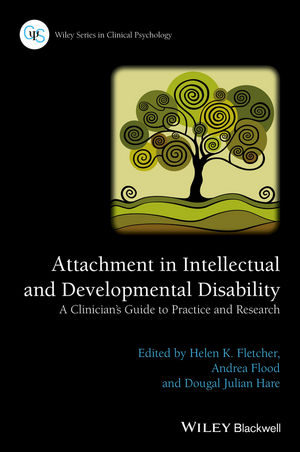
Attachment in Intellectual and Developmental Disability
Wiley-Blackwell (Verlag)
978-1-118-93803-4 (ISBN)
Attachment in Intellectual and Developmental Disability “Skillfully introduced and edited by Helen Fletcher and her colleagues, this long-needed collection of excellent chapters on attachment and disability reveals the vast wellspring of resilience that persons with disability possess – or can be helped to achieve. Readers will discover how best to support a family member, client or friend with a ‘disability’. A definitive resource for multiple disciplines, this book is surely required reading for all those working in the health professions aimed at addressing the needs of those with severe physical, mental or emotional impairments.”
Professor Howard Steele, New School for Social Research
“This informative, comprehensive text is unique, and is destined to become an invaluable national and international resource on attachment issues in the field of intellectual and developmental disabilities. Given the breadth and depth of this book, practitioners can use it both as a guide in practice and as a resource for research purposes. Both the editors and contributors are to be congratulated for introducing attachment theory to a wider audience, who will all, I am sure, appreciate the centrality and importance of this theoretical framework to their everyday practice.”
Professor Bob Gates, University of West London
This title in The Wiley Series in Clinical Psychology is the first to explore the role of attachment theory in understanding and helping children and adults with intellectual and developmental disabilities (IDD). There is a growing evidence base of interventions for IDD underpinned by attachment theory, including direct intervention and the application of attachment theory to understand the interactions and relationships that occur between individuals with IDD and those who support them.
Attachment in Intellectual and Developmental Disability brings together leading clinicians and researchers to present and integrate cutting-edge models and approaches that have previously been accessible only to specialists. They discuss the role of attachment theory in clinical practice when working across the lifespan of people with IDD, the theoretical basis of attachment difficulties, and how these difficulties are presented. They also discuss practical approaches to assessment and intervention, using clear case studies to illustrate the applications of attachment theory to clinical work.
Helen K Fletcher is a Chartered Clinical Psychologist within Southern Health NHS Trust and a Visiting Tutor for the Oxford Institute of Clinical Psychology Training. She has over twelve years of experience working with children and adults with IDD within the NHS in Community, Inpatient and Specialist Teams. Helen has carried out research in the area of Attachment and ID and has presented on the topic at national conferences. Andrea Flood is a Chartered Clinical Psychologist, who has worked with children and adults with intellectual disabilities and /or autism spectrum disorder since qualifying in 2004. She currently works as a Clinical Teacher on the Doctorate in Clinical Psychology Programme at Liverpool University. Andrea is a co-author of the Manchester Attachment Scale – 3rd party observational measure (MAST). Dougal Julian Hare is Reader in Clinical Psychology at Cardiff University and Research Director for the South Wales clinical psychology training programme. He has practiced as a Chartered Clinical Psychologist working with people with intellectual and developmental disabilities (IDD) for nearly twenty years and has been an author on over eighty peer-reviewed articles and chapters in the fields of ID, neuropsychology and personal construct psychology.
About the Contributors vii Foreword xiv
Acknowledgements xvi
Chapter 1 Introduction 1
Dougal Julian Hare, Helen K Fletcher and Andrea Flood
Chapter 2 An Overview of Attachment Theory: Bowlby and Beyond 8
Helen K Fletcher and Deanna J Gallichan
Chapter 3 Attachment Relationships Between Parents and Their Children: The Impact of ‘The Loss of the Healthy Child’ 33
Helen K Fletcher
Chapter 4 Assessing Attachment Relationships in People with Intellectual Disabilities 59
Samantha Walker, Victoria Penketh, Hazel Lewis and Dougal Julian Hare
Chapter 5 Autism Spectrum Disorder and Attachment: A Clinician’s Perspective 79
Ewan Perry and Andrea Flood
Chapter 6 Maintaining the Bond: Working with People who are Described as Showing Challenging Behaviour Using a Framework Based on Attachment Theory 104
Allan Skelly
Chapter 7 Psychotherapy and Attachment Dynamics in People with Intellectual Disabilities: A Personal View 130
Pat Frankish
Chapter 8 Adult Attachment and Care Staff Functioning 151
Carlo Schuengel, Jennifer Clegg, J Clasien de Schipper and Sabina Kef
Chapter 9 Have a Heart: Helping Services to Provide Emotionally Aware Support 172
Amanda Shackleton
Chapter 10 Attachment Trauma and Pathological Mourning in Adults with Intellectual Disabilities 197
Deanna J Gallichan and Carol George
Chapter 11 Attachment, Personality Disorder and Offending: Clinical Implications 223
Lesley Steptoe, William R Lindsay, Caroline Finlay and Sandra Miller
Chapter 12 Getting Intimate: Using Attachment Theory to Understand Intimate Relationships in our Work with People with Intellectual Disabilities 244
Nancy Sheppard and Myooran Canagaratnam
Index 266
| Erscheinungsdatum | 10.05.2016 |
|---|---|
| Reihe/Serie | Wiley Series in Clinical Psychology |
| Verlagsort | Hoboken |
| Sprache | englisch |
| Maße | 160 x 236 mm |
| Gewicht | 581 g |
| Themenwelt | Geisteswissenschaften ► Psychologie ► Klinische Psychologie |
| Sozialwissenschaften ► Pädagogik | |
| ISBN-10 | 1-118-93803-8 / 1118938038 |
| ISBN-13 | 978-1-118-93803-4 / 9781118938034 |
| Zustand | Neuware |
| Haben Sie eine Frage zum Produkt? |
aus dem Bereich


